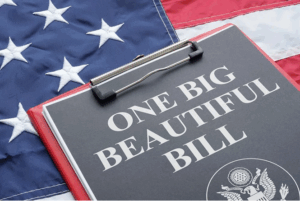
In recent years, startup founders, angel investors, and venture capital funds alike have benefited from the IRS’s qualified small business stock (“QSBS”) tax exemption rules (the “QSBS Rules”). The QSBS Rules contain a major tax exemption and are intended to incentivize investment in startups and small businesses based in the United States. Following the enactment of the One Big Beautiful Bill Act (the “OBBBA”) on July 4, 2025, the scope of the QSBS Rules has been further expanded on multiple fronts, including both dollar value adjustments to account for inflation and expanded access to the exemption for small businesses and startups.
SUMMARY OF CHANGES
Generally speaking, for shares of stock issued before July 4, 2025, the QSBS Rules enable shareholders of “qualified small businesses” to sell their shares without any taxation on up to $10 million in capital gains if they have held their shares for at least five years. For shares of stock issued after July 4, 2025, the OBBBA will expand the QSBS Rules by:
- increasing the capital gains cap applicable to the exemption from $10 million to $15 million;
- increasing the “aggregate gross assets” cap applicable to the business issuing the QSBS from $50 million to $75 million; and
- replacing the hard, 5-year holding period with a tiered structure that provides (1) a 50% tax exemption at 3 years, (2) a 75% tax exemption at 4 years, and (3) a 100% tax exemption at 5 years from issuance.
KEY TAKEAWAYS
- Access to QSBS tax treatment has been significantly expanded by the OBBBA, both in terms of the size of individual tax pay exemptions and the size of corporations that may issue shares of QSBS, making now a great time for founders, angel investors, and venture capital groups to connect with legal and tax advisors and implement a QSBS compliant exit strategy.
- Corporations who have recently issued equity and whose shares qualify for QSBS treatment or who would be deemed as qualified small businesses under the OBBBA amendments should coordinate with legal and tax advisors to determine whether an issuance or other transaction could provide shareholder access to QSBS tax treatment.
THE OBBBA’S NEW QSBS RULES: AN IN-DEPTH REVIEW
The QSBS tax exemption was enacted in 1993 and initially provided a 50% tax exemption on up to $10 million in capital gains for the sale of QSBS. Beginning in 2010, the QSBS exemption was repeatedly expanded by subsequent legislation to ultimately provide a 100% tax exemption for QSBS issued after September 27, 2010. For shares of QSBS issued prior to September 27, 2010, the 50% tax exemption still applies; similarly, for shares of QSBS issued prior to July 4, 2025, the pre-OBBBA QSBS Rules (exclusive of the changes referenced above) will continue to apply.
Tax-Exempt Capital Gains Cap
The pre-OBBBA QSBS Rules set a “per-issuer limitation on [a] taxpayer’s eligible gain”, meaning that the maximum amount of tax-exempt capital gains from the sale of stock of a single qualified small business is $10 million. Notably, the limitation is “per issuer” or issuer specific, so a separate $10 million cap on tax exempt capital gains applies to the sale of the QSBS of different qualified small businesses, even if those capital gains are received by the same taxpayer. Additionally, for married taxpayers filing separately, the capital gains cap is limited to $5 million per spouse.
With the enactment of the OBBBA, the annual tax-exempt capital gains cap applicable to the sale of QSBS acquired after July 4, 2025, has been increased to $15 million. Further, for each tax year after 2026, the tax-exempt capital gains cap of $15 million for the sale of such QSBS will be increased annually to account for inflation.
Qualified Small Business Definition and Aggregate Gross Assets Cap
Because QSBS is stock issued by a “qualified small business”, the definition of qualified small business under the QSBS Rules is particularly meaningful. Under the pre-OBBBA rules, the term “qualified small business” means any U.S. domestic C corporation if the aggregate gross assets of such corporation at all times prior to and immediately following the date of the issuance of any purported shares of QSBS are less than or equal to $50 million. As used in the QSBS Rules, “aggregate gross assets” means the amount of cash and the aggregate adjusted bases of other property held by the purported qualified small business. Notably, the aggregate gross assets of a qualified small business include the assets of any affiliates of the business.
Following the enactment of the OBBBA, a business can now be deemed a qualified small business if it holds aggregate gross assets less than or equal to $75 million. Further, for each tax year after 2026, the aggregate gross assets cap of $75 million will be increased annually to account for inflation.
Holding Periods for QSBS
The pre-OBBBA QSBS Rules require, for any shares of QSBS to be eligible for tax exemption upon sale, that the holder of such shares have acquired those shares at least five years prior to the date of sale. No tax exemption is available under this regime until the completion of the five-year holding period.
Unlike the changes to the tax-exempt capital gains cap and the aggregate gross assets cap which, as described above, primarily constitute increases to dollar values to account for inflation, the OBBBA has made more sweeping changes to the QSBS holding period requirement by replacing the hard 5-year cap with tiered, partial exemptions applicable at to QSBS held between three and five years. While shares of QSBS must still be held for five years to receive 100% tax exempt treatment, the OBBBA has added the following holding periods and exemptions:
| Years stock held | Percentage of Exemption |
| 3 years | 50% |
| 4 years | 75% |
| 5 years or more | 100% |
MATERIAL QSBS RULES NOT AFFECTED BY OBBBA
While the OBBBA has certainly modernized the QSBS Rules to the benefit of founders and startup funding groups, stakeholders should be aware of the several QSBS requirements that remain unchanged:
QSBS Acquired Prior to July 4, 2025: For all QSBS issued prior to July 4, 2025, the changes described above are of no affect, and all prior thresholds (including the $10 million tax-exempt capital gains cap, the $50 million aggregate gross assets cap, and the hard 5 year holding period) remain in place;
Issuer Must be a C Corporation: For stock to receive QSBS treatment under the QSBS Rules, it must be issued by a corporation taxed as a C corporation. Notably, this means that if a corporation has previously made an S Corp election, its stock will not be eligible for QSBS tax treatment.
QSBS Must be Acquired from the Issuer: For stock to receive QSBS treatment under the QSBS Rules, the taxpayer seeking QSBS treatment must have acquired the stock directly from the issuer at the stock’s original issuance. This means that stock will not be eligible for QSBS tax treatment if it was acquired in a secondary sale.
Qualified Trade or Business: To constitute a qualified small business, a business must be engaged in a “qualified trade or business,” meaning any trade or business other than:
- Any trade or business involving the performance of services in the fields of health, law, engineering, architecture, accounting, actuarial science, performing arts, consulting, athletics, financial services, brokerage services, or any trade or business where the principal asset of such trade or business is the reputation or skill of 1 or more of its employees;
- Any banking, insurance, financing, leasing, investing, or similar business;
- Any farming business (including the business of raising or harvesting trees);
- Any business involving the production or extraction of natural deposits, such as mines or wells for the extraction of minerals or gases; and
- Any business of operating a hotel, motel, restaurant, or similar business
Actively Engaged in Qualified Trade: To constitute a qualified small business, a business must be “actively” engaged in its qualified trade or business, meaning that at least 80% (by value) of the business’s aggregate gross assets must be used for the purpose of conducting the qualified trade or business as describe above.
Maximum Portfolio Stock or Investment Securities: To constitute a qualified small business, a business may not hold stock or securities in other corporations that are not subsidiaries of the business and that constitute more than 10% (by value) of the business’s aggregate gross assets. For the purposes of the QSBS Rules, a corporation is a subsidiary if the parent owns more than 50% of the voting power or value of all outstanding stock of such corporation.
Maximum Real Estate Investment Holdings: To constitute a qualified small business, a business may not hold real property for investment or otherwise not used for the business’s qualified trade or business that constitutes more than 10% (by value) of the business’s aggregate gross assets.
Ultimately, even as amended by the OBBBA, the QSBS Rules are detailed and specific, and stakeholders should carefully review these rules with legal and tax advisors to ensure that QSBS treatment is afforded to their shares.

